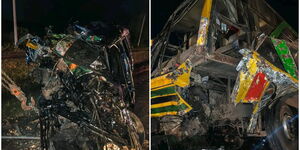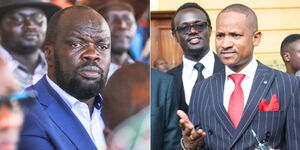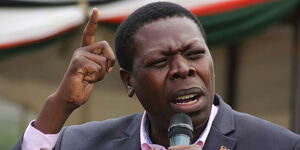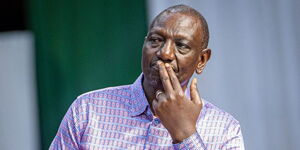Journalists are known to research and uniquely package stories that play the conceptual role of agenda-setting.
A recent example would be that of Julius Wambua, a man serving a life sentence after being allegedly framed by his daughter in a defilement.
The story was highlighted by Citizen TV's Lulu Hassan and a year later, High Court Judge George Odunga overturned the ruling and released a jubilant Wambua on bail.
Such inspirational stories resonate well with the public; inviting conversations on social media pages and among the Kenyan public. Some stories will cause an uproar and anger, putting authorities to task and demanding more from them.Some of these stories have forced the government to intervene on cardinal issues like corruption.
Below are some of the stories that formed conversations in 2020;
1.) Baby stealers
BBC Africa Eye ran a story on November 16 that uncovered damning evidence of a thriving underground trade in stolen children in Nairobi, Kenya. The story sent shock waves down the spine.
The story included shocking undercover footage of children being stolen at a hospital in Nairobi, and others being sold on the streets of Nairobi for as little as Ksh45,000.
The documentary exposed a medical officer from a public hospital in Nairobi who was captured on camera forging legal paperwork to sell a 2 weeks old baby to an undercover journalist posing as an interested buyer.
The documentary went on to uncover an illegal facility where mothers were giving birth and their babies immediately sold off.
The information caused a stir online leading to the arrest of 3 medical officers believed to be a part of the child trafficking syndicate.
2.) Covid-19 millionaires
In August 2020, investigative journalist Dennis Okari uncovered a mega-graft scandal regarding misuse of billions of shillings allocated for Covid-19 pandemic.
The report revealed how large consignment of donations including masks and ventilators from Chinese billionaire Jack Ma went missing once they arrived in the country.
Those interviewed alleged that at least three quarters of the consignment was shipped off to Tanzania by well-connected wheeler-dealers, while some was sold off to various institutions in Kenyan.
The exposé sparked fury among Kenyans, with Covid-19 millionaires trending on Twitter the better part of the day prompting the government to take action.
3.) Match-fixing in Kenya
An investigative feature on how Kenyan football had been marred with match-fixing.
The feature by NTV's Idah Waringa which aired in July exposed alleged key players in the intricate web of match-fixing that included football players, referees and 'money men' from as far away as Singapore.
"My defenders were scoring own goals, it happened about thrice and this caught my attention as it did not make any sense. I carried out my own investigations and found that the defenders, as well as the coach, were being paid to ensure matches ended in a scripted way," Kakamega Homeboyz Football Club chairman Cleophas Shimanyula stated while speaking about the alleged scandal in the local football.
4.) Virus safaris
The expose was aired at the height of the Covid-19 pandemic, just after President Uhuru Kenyatta announced cessation of movement in and out of Nairobi, Mombasa, Kwale and Kilifi counties.
The feature, which was done by Citizen TV's investigative reporter Purity Mwambia, highlighted the open disregard for the law on the roads during a pandemic. The story showed just how easy it was to circumvent the restriction of movement order in and out of Nairobi, despite the ban at the time.
Mwambia used her personal journey to uncover how easy it was to move around the roadblocks by alighting from the car, walking past the police officers or taking a motorbike.
The feature caused an uproar from a number of Kenyans who argued that the country was facing bigger challenges.
"Purity Mwambia, you can't just be snitching on struggling citizens. Not in a black state," a user stated. The comments showed just how much corruption and fraud had become entrenched into the DNA so much that it had been normalised.
5.) KEMSA passerby
The story of a passerby who won Ksh180 Million KEMSA tender without breaking sweat broke the internet. James Njuguna who won the tender to supply Personal Protective Equipment (PPEs) said he won the deal by accident.
Appearing before the investigating committee, Njuguna indicated that he was just passing by outside the KEMSA offices when he saw individuals lining up, and got curious of the happenings, prompting him to go and have a look at what was happening.
Njuguna narrated that he approached a receptionist who advised him to apply for the tenders which were being flouted. He immediately wrote a two-sentence letter and after two hours, got a response that he had been awarded the tender.
Njuguna's narration went viral, eliciting a number of mixed reactions from Kenyans.












